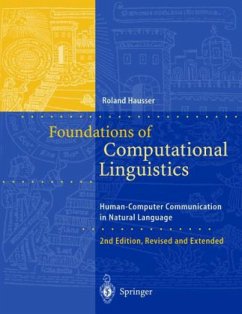The central task of a future-oriented computational linguistics is the development of cognitive machines which humans can freely talk with in their respective natural language. In the long run, this task will ensure the development of a functional theory of language, an objective method of verification, and a wide range of practical applications. Natural communication requires not only verbal processing, but also non-verbal perception and action. Therefore the content of this textbook is organized as a theory of language for the construction of talking robots. The main topic is the mechanism of natural language communication in both the speaker and the hearer. The book contains more than 700 exercises for reviewing key ideas and important problems. In the 2nd edition, Chapters 22-24 have been completely rewritten. They present a declarative outline for programming the semantic and pragmatic interpretation of natural language communication.
From the book reviews:
"This is a very abstract theoretical approach to language computation dating from Frege's principles, to DeSaussure's theories, and beyond. ... This book is meant for a wide audience including students, fellows, researchers, professors, and so on in the history of logical principles. I heartedly recommend it to everyone." [Joseph J. Grenier, Amazon.com, July, 2014]
"Reviewing the logical foundations of computing, Hausser's textbook - now in its third revised edition, with new chapters - provides the student of natural language with a computable theory of meaning without syntactic constituent structure. A quantifier-free fragment treats anaphora as addresses, where connectives are operations on patterns, its data structures support inference rules as patterns of grammar. Used all over the world in computational linguistics programs, this important book is recommended for anyone who grasps the limitations of a purely inductive, statistical approach to meaning and language processing." [Alice G.B. ter Meulen, Université de Genève]
"Hausser rocks the foundations of truth-conditional semantics for natural language." [Kiyong Lee, Korea University, Seoul]
"This book is a solid foundation for the computational modeling of human communication in natural language, and it is also a systematic explanation of how to make a talking robot." [Haitao Liu, Zhejiang University, P.R. China]
"This is a very abstract theoretical approach to language computation dating from Frege's principles, to DeSaussure's theories, and beyond. ... This book is meant for a wide audience including students, fellows, researchers, professors, and so on in the history of logical principles. I heartedly recommend it to everyone." [Joseph J. Grenier, Amazon.com, July, 2014]
"Reviewing the logical foundations of computing, Hausser's textbook - now in its third revised edition, with new chapters - provides the student of natural language with a computable theory of meaning without syntactic constituent structure. A quantifier-free fragment treats anaphora as addresses, where connectives are operations on patterns, its data structures support inference rules as patterns of grammar. Used all over the world in computational linguistics programs, this important book is recommended for anyone who grasps the limitations of a purely inductive, statistical approach to meaning and language processing." [Alice G.B. ter Meulen, Université de Genève]
"Hausser rocks the foundations of truth-conditional semantics for natural language." [Kiyong Lee, Korea University, Seoul]
"This book is a solid foundation for the computational modeling of human communication in natural language, and it is also a systematic explanation of how to make a talking robot." [Haitao Liu, Zhejiang University, P.R. China]

